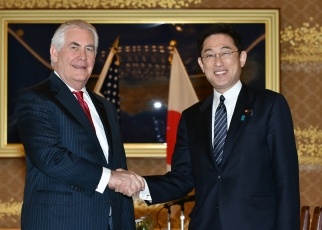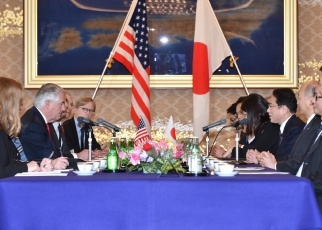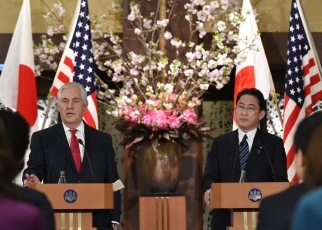Japan-United States of America Relations
Japan-U.S. Foreign Ministers’ Meeting
March 16, 2017



On March 16, commencing at 2:15 p.m. for approximately one hour and 20 minutes, Mr. Fumio Kishida, Minister for Foreign Affairs, held a Japan-U.S. Foreign Ministers' Meeting with the Honorable Rex W. Tillerson, Secretary of State of the United States of America, who was visiting Japan. Following a joint press conference after the meeting, Minister Kishida held a working dinner commencing shortly after 5:40 p.m. for nearly one hour. The overview of the meeting is as follows.
Furthermore, under the U.S. reviewing process of its policy towards North Korea, Minister Kishida conveyed Japan's views, and the two sides confirmed that Japan and the United States will solidly coordinate their policies, continue to deepen collaboration, and form a shared position between Japan and the United States.
Additionally, Minister Kishida stated that the abductions issue is a grave problem that concerns Japan's sovereignty and the lives and safety of its citizens, and it is one of the top priorities of the Abe Administration. The two sides confirmed that Japan and the United States will continue to collaborate.
1 Opening and general remarks
Minister Kishida welcomed Secretary Tillerson's visit to Japan shortly after his appointment, and, in particular, highly appreciated his choice to visit Japan as the first country in Asia since it demonstrates the U.S. position to put importance on Japan and the Japan-U.S. Alliance. In response, Secretary Tillerson stated that his choice of Japan as his first country in Asia to visit as Secretary of State shows the importance that the United States attaches to its relationship with Japan. The two sides confirmed that concrete cooperation between Japan and the United States will make further progress on the basis of the outcomes of the previous Japan-U.S. Summit Meeting.2 Japan-U.S. security
(1) Japan-U.S. security
On the basis of the joint statement made by the two leaders in February, which emphasizes that the United States will strengthen its presence in the region and Japan will shoulder a greater role and responsibility in ensuring the peace and stability of the regional and international communities, the two sides discussed the agenda for the first "2+2" Ministerial Meeting, and shared the view that they will accelerate coordination on the timing to hold the meeting promptly.(2) Okinawa
Minister Kishida emphasized the necessity to mitigate the impact on Okinawa in a visible way, and the two sides agreed that both Japan and the United States will cooperate on this point. Additionally, they reconfirmed that relocating Marine Corps Air Station (MCAS) Futenma to Henoko is the only solution.3 Situation in the Asia-Pacific region
(1) North Korea
The two sides shared the recognition that North Korea's nuclear and missile development programs are totally unacceptable, confirmed that Japan, the United States and the Republic of Korea (ROK) will coordinate to strongly urge North Korea to exercise self-restraint by refraining from provocative actions and to comply with the relevant United Nations Security Council (UNSC) resolutions, and also discussed the importance of China's role. In addition, the two sides confirmed the importance of advancing cooperation between Japan and the United States and among Japan, the United States and the ROK, including on fields such as security.Furthermore, under the U.S. reviewing process of its policy towards North Korea, Minister Kishida conveyed Japan's views, and the two sides confirmed that Japan and the United States will solidly coordinate their policies, continue to deepen collaboration, and form a shared position between Japan and the United States.
Additionally, Minister Kishida stated that the abductions issue is a grave problem that concerns Japan's sovereignty and the lives and safety of its citizens, and it is one of the top priorities of the Abe Administration. The two sides confirmed that Japan and the United States will continue to collaborate.

